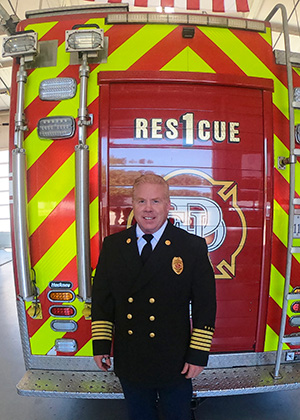Fire chief: Challenges of career are many, but so are rewards

As a San Jacinto College firefighter student, Mike Vogel might not have aspired to become fire chief of Paris. But last April, he did just that.
Of course, at population 25,000, with its Eiffel Tower sporting a tilted cowboy hat, this northeast Texas town is a tad smaller than its namesake city. Vogel nonetheless fills a large role as he works to expand the Paris Fire Department's reach to the entire county.
"I'm the 14th fire chief but only the second one hired from outside the department," he said. "I come from a metroplex, so I had ideas to progress the department and enhance our medical role to help citizens."
"Go to College"

But when he tried applying for a full-time firefighting position in Houston, he was surprised to hear "Go to college and paramedic school."
Enter San Jacinto College. While working full time in the early 1990s, Vogel attended the College's firefighter and paramedic programs, earning his associate degree in 1995.
Although not required, paramedic certification makes firefighters much more marketable, he said.
"I needed to finish my degree to advance in the profession and in the ranks. The interaction with my San Jac instructors really pushed me," he said.
Career Like No Other
With a degree in hand and fire academy under his belt, Vogel became a full-time firefighter/paramedic in The Woodlands. Later, seeking more growth opportunities, he transferred to the Arlington Fire Department.
For two decades, Vogel worked his way up the ranks in Arlington from firefighter to deputy fire chief supervising a crew of 101.
During those years, he won multiple lifesaving awards. But it's the faces, not the awards, he remembers: a woman and her dog rescued from a raging apartment fire, the 8-year-old boy revived after collapsing on a gym floor from cardiac arrest.
"It's the best job in the world. The opportunity to serve people, to give back is like none other," he said.
Thanks to extensive training and certifications, Vogel also boasts a storied career. Among his responsibilities was preparing Dallas/Fort Worth paramedics who transported patients with the Ebola virus. He showed them how to don HAZMAT suits, partition the ambulance with plastic sheets, and follow Centers for Disease Control and Prevention guidelines to the nth degree.
Bird's-eye View
Challenges of a firefighting career? Vogel can name a few. Like the schedule: 24 hours on, 48 hours off, and no such thing as a sleep cycle.
"You're away from your family one third of the time. You miss your kids' baseball games, birthdays, and holidays -- things others take for granted," he said.
You also witness many tragedies -- people you can't rescue or colleagues you lose in the line of duty.
"They talk about it in paramedic school, but you're not really prepared for it. You think you're going to go out and save everyone, but you can't," he said.
Still, Vogel calls firefighting one of the greatest professions.
"The friendships you forge are extremely strong because you have to rely on each other so much," he said. "If you like to work on your own -- like independence -- this job isn't for you. It's a way to serve humanity, to make a difference in others' lives."
And when it comes to making a difference, no task is too big or too small -- even rescuing a citizen's beloved pet.
"Yes, I've pulled cats out of trees," Vogel said, laughing. "But, like I always tell people, have you ever seen a cat's skeleton in a tree?"
